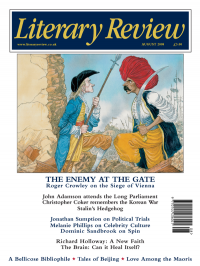Toby Barnard
Brewing Troubles
God’s Executioner: Oliver Cromwell and the Conquest of Ireland
By Micheál O’Siochrú
Faber & Faber 336pp £14.99
Oliver Cromwell’s conduct in Ireland between 1649 and 1650 appals even his admirers. The slaughter of civilians as well as soldiers within the walled towns of Drogheda and Wexford smacked more of the savagery of Continental European warfare than of the British civil wars. A variety of explanations has been used, if not to excuse, then at least to explain the lapse into brutality. Centuries of English contempt for the Irish and more recent Protestant animosity towards superstitious Catholics are seen as factors. So, too, is the belief shared by Cromwell and his soldiers that a few years earlier the Catholics of Ireland had massacred many thousands of their Protestant neighbours. Another plausible argument is that of military necessity: by making an example of the inhabitants of the two strongholds on the eastern seaboard, Cromwell thought he would shorten the war of reconquest. Also powerful as a force was the religious zeal which animated Cromwell and his army. Following a series of remarkable victories in England and Scotland, they saw themselves as agents of an angry God. Finally, there is the more prosaic and humiliating suggestion that the commander, elsewhere noted for his iron discipline, lost control of his men as they stormed the Irish towns. Plunder and reprisals resulted.
Micheál O’Siochrú is the latest historian to tackle these grizzly events. Faced with the jagged trajectory of the Irish war of the 1640s, he constructs a smooth narrative. In dealing with the gore, he does not wallow. Instead he readily – perhaps too readily – applies the modern concepts of

Sign Up to our newsletter
Receive free articles, highlights from the archive, news, details of prizes, and much more.@Lit_Review
Follow Literary Review on Twitter
Twitter Feed
It wasn’t until 1825 that Pepys’s diary became available for the first time. How it was eventually decrypted and published is a story of subterfuge and duplicity.
Kate Loveman tells the tale.
Kate Loveman - Publishing Pepys
Kate Loveman: Publishing Pepys
literaryreview.co.uk
Arthur Christopher Benson was a pillar of the Edwardian establishment. He was supremely well connected. As his newly published diaries reveal, he was also riotously indiscreet.
Piers Brendon compares Benson’s journals to others from the 20th century.
Piers Brendon - Land of Dopes & Tories
Piers Brendon: Land of Dopes & Tories - The Benson Diaries: Selections from the Diary of Arthur Christopher Benson by Eamon Duffy & Ronald Hyam (edd)
literaryreview.co.uk
Of the siblings Gwen and Augustus John, it is Augustus who has commanded most attention from collectors and connoisseurs.
Was he really the finer artist, asks Tanya Harrod, or is it time Gwen emerged from her brother’s shadow?
Tanya Harrod - Cut from the Same Canvas
Tanya Harrod: Cut from the Same Canvas - Artists, Siblings, Visionaries: The Lives and Loves of Gwen and Augustus John by Judith Mackrell
literaryreview.co.uk